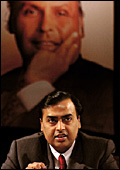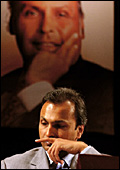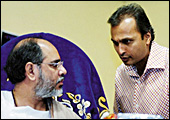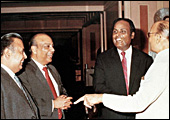 |
 |
| Sibling rivalry: Will the brother reach
a separation settlement by December 28, the birth anniversary
of their father? |
Sunday,
5th December 2004, 10:30 am. Location: Eighth floor, Seawind, the
room of the late Dhirubhai Ambani, founder patriarch of the Reliance
group of companies. Present are the warring Ambani brothers, Mukesh
and Anil, their respective wives Nita and Tina, sisters Dipti Salgaonkar
and Nina Kothari, and the matriarch of the family, Kokilaben. Over
the next couple of hours, discussions on how the family estate and
assets should be apportioned between the brothers, sisters and mother
are carried out. It's at this meeting that the first concrete option
for a split between the Chairman and the Vice Chairman of the Rs
75,556-crore flagship takes shape: Take ownership and control of
Reliance Energy, Reliance Capital and Rs 10,000 crore, and also
be assured of feedstock (gas) from RIL for Reliance Energy's gas
business (the price of the gas, by when would supply begin, the
quantum and other such details would need to be worked out), is
what Mukesh would have thought a fair offer. What would have been
left unsaid is: Keep your hands off RIL. That's mine.
THE FLASHPOINTS
Anil's "inconsistencies" according to RIL spokespersons. |
» Anil
announced the UP project without discussions with the RIL board.
The board did discuss power sector ventures, but only in the
context of larger opportunities, and not any specific project.
» Anil decided
to get into politics without informing the RIL board. Although
Dhirubhai was perceived to be pro-Congress, RIL spokespersons
insist that Reliance has always stayed neutral and the patriarch
firmly believed that one can't afford to take political sides
when in business. Anil was going against that belief.
» Anil was
responsible for the bid for modernising the Mumbai and Delhi
airports without consulting the board. Mukesh wasn't keen. |
When that offer was indeed made last fortnight,
Anil Ambani, 45, obviously wasn't in any mood to accept it, and
insiders close to him reveal that more than Reliance Energy and
Reliance Capital, it's RIL that's the largest gleam in the Vice
Chairman's eye. If Mukesh does after all control most, if not all,
of the 34-odd per cent of the shares of RIL that constitute the
persons acting in concert with the promoters, he's firmly in the
driver's seat, and Anil sympathisers point out it's that holding
that needs to be divided equally between the brothers. If that is
at all possible, it would mean that not only does Anil continue
as a Managing Director at RIL, he also gets a chance to take charge
of a few of RIL's lucrative newer businesses like gas exploration,
production and transportation, and gets more than a few fingers
in the pie of 45 per cent RIL-owned subsidiary, Reliance Infocomm.
Insiders at RIL emphatically state that such
an arrangement isn't acceptable to the Chairman, and even more preposterous
is the idea of splitting this highly-integrated oil-to-textiles
conglomerate between the two brothers. The idea of Anil continuing
to function, even in a secondary role at RIL, they add, is unacceptable
because of his several "inconsistencies" earlier in the
year, when he announced the up power project, entered politics and
bid for airport modernisation projects without taking the RIL board
into confidence. In such a scenario, the only room for negotiation
is for Mukesh to take up the cash settlement figure. At the time
of writing, another family meeting appeared imminent, and RIL insiders
are upbeat that a settlement will be thrashed out by December 28-the
birth anniversary of the late RIL founder.
| THE INFOCOMM BROUHAHA |
CHARGE
»
RIL was providing 90 per cent of the funding, yet it was a minority
shareholder in the project
» How can
the Chairman himself be allocated sweat equity?
» RIL gets
an annual dividend of just Rs 16 crore on a Rs 8,100-crore investment
via the preference share issue
DEFENCE
»
RIL directly and indirectly controls just under 37 per cent
in Infocomm (taking into account holding company RCIL), and
this will go up significantly once preference shares are converted
» It's
an accepted practice in IT and telecom. Moreover, the Chairman
was hands-on and had an executive role in the project. Agreement
between RCIL and Mukesh for sweat equity entered into in July
2000
» Fully-convertible
cumulative preference shares are ideal for long-gestation
projects such as this, because it takes care of the downside.
If things go wrong, investors can still get 8 per cent tax-free
returns at redemption
|
From Anil's point of view, Rs 10,000 crore as
a settlement would seem abysmal considering that Mukesh wants to
keep RIL all to himself. According to the BT 500, for the first
half of 2004-2005, RIL had an average market cap of Rs 67,000-odd
crore. Reliance Energy and Reliance Capital-which Anil has been
offered-together had a market cap of a little over Rs 13,230 crore,
which works out to less a fifth of RIL's value. In revenue terms
too, RIL makes up three-fourths of the group, and don't forget the
huge upside that exists in the new businesses of oil and gas, petroleum
marketing, and infocomm. What's more, Anil has huge plans for Reliance
Energy in generation, transmission and distribution, entailing an
investment outlay of Rs 25,000 crore. Assuming a 3:1 debt/equity
ratio (largely the norm for power projects), Reliance Energy still
has huge commitments to make over the next few years. But then again,
the question of an equitable split between the two brothers doesn't
exist if Mukesh Ambani as Chairman does control a huge chunk of
the promoter's stake, with Anil's holding on the other hand in very
low single digits.
Unsurprisingly, the mood is sombre and tense
at the residence and headquarters of the Ambanis, and sources in
the hospitality industry point out that a number of the family's
functions that were to be hosted at the two premier five-star hotels
in south Mumbai have been cancelled in this festive season. RIL
insiders instead point to the likelihood of a Krishna Katha being
resorted to for nine days into the New Year in Jamnagar by the family
matriarch, presumably to hammer home the message that divine pure
love matters more than more mundane material conquests.
 |
| Anil with Ramesh Oza: Guru's intervention
isn't enough |
Of course, a settlement or, rather, a separation
by December 28 would make the Krishna Katha immensely more pleasurable
for all, including the hundreds of VIPs to whom invitations will
be extended. More significantly, it will also send out a message
of confidence and security to the 3.5 million shareholders of the
group-including the foreign investors with a 22.85 per cent holding
in RIL, many of whose representatives, reveal company insiders,
were present at an informal meeting on the evening of December 4,
at the poolside of Seawind (one day prior to the family meeting),
where they were assured that matters would be resolved swiftly.
 |
| The Chairman is king: Dhirubhai H. Ambani
(second from right) with his brothers Natubhai (extreme left)
and Ramnikbhai (second from left) |
To be sure, this isn't the first time RIL's
integrity as a single entity has been threatened-and it's precisely
because of this earlier threat that the company is better placed
this time round to protect shareholder interests, and those of the
Chairman. RIL insiders reveal that in the early to mid-eighties,
when Dhirubhai was Chairman, he had elder brother Ramniklal as Joint
Managing Director, and youngest brother Natvarlal as an Executive
Director. At some point, not too long before Dhriubhai was hit by
a stroke in the mid-eighties, the uncomfortable topic of dividing
Reliance between the three brothers came up. Dhirubhai was reportedly
furious, and that's when he decided that going forward, the Chairman
would always be the central authority at Reliance rather than the
family, by controlling the company via a maze of hundreds of investment
companies (in due course, he got his brothers out of RIL by offering
them settlements of a few hundred crores-said to be higher than
the value of their shareholding at that time). At last count, one
insider puts the number of these investment firms at 361, although
figures ranging from 400 to 1,400 have been doing the rounds in
the media. That's why RIL spokespersons keep stressing on "the
architecture of ownership" of Reliance shares by the family,
which "has been configured by Dhirubhai in a framework of companies.
Given this configuration it obviates the necessity for a will. This
architecture reflects the far-sightedness of Dhirubhai, who believed
that Reliance went far beyond the character of a family-owned company...."
They also add that the apparent "redefinition" of the
powers of the RIL Chairman, the RIL Vice Chairman and the Executive
Directors at the July 27, 2004 board meeting (which allowed the
Chairman to revoke decisions taken by other EDs) was in fact more
of a restatement. "That the Chairman is the final authority
had already been decided by the board. At the July meeting, it was
only restated," adds the spokesperson.
| A SURVIVOR'S TALE |
 |
| Walchand Capital's Jha: Lessons from
the past |
Every business family conflict
is driven by its own unique circumstances, reason (or the lack
of it), and protagonists, some offended, some the offenders.
Yet, every such bruising battle between blood brothers and sisters
(and uncles and cousins) for property, power, assets and cold
cash has plenty in common: Palace intrigue, family friends,
friendly professionals, spiritual gurus, mediators, a battery
of legal and accounting experts, and of course the media, sections
of which in lapses of delusion attempt to play peacemaker. In
a few such family fracases, there's also a matriarch, who's
helplessly thrust forward to take a moral decision and decide
the fate of a conglomerate worth thousands of crores. "When
my father (Bahubali Gulabchand) passed away, my mother was expected
to decide an equitable division between us three daughters,
which she obviously wasn't in a position to do as she had little
clue about the business. Fortunately in our case, she did not
compromise on her relationships," points out Pallavi Jha,
Chairman & Managing Director, Walchand Capital, who has
been through a decade of painful "restructuring" in
two phases, involving uncles, cousins, sisters and the inevitable
"advising henchmen".
According to Jha, when the patriarch from the previous generation-for
whom the younger lot would have had immense respect-passes
away, the peers begin to compete, and that's when things come
to a boil. "Trust levels get compromised, and the obsession
for money and power becomes more critical than relationships."
Without getting into the specifics of the Walchand split,
it's adequate to say that the settlements were messy, and
took their time. For instance, in the first phase when the
Doshis and the Gulabchands slugged it out, Jha points out,
it took close to four years for a settlement to be thrashed
out, aided largely by mediation from Sharad Pawar, Rahul Bajaj
and the late S.S. Nadkarni. After much haggling, a Rs 50-crore
figure was arrived at as compensation from the Doshis to the
Gulabchands.
Jha also makes the more significant point that "if
splits are not quickly reached, they can breed stagnation".
Business activity gets stalled, dirty linen is washed in not
just the eyes of the public but also the regulators, camps
are created between employees, and shareholder wealth is destroyed.
"It's a kind of cultural destruction, and is a lose-lose
situation." The best indicator of such ruin is the fate
of Premier Automobiles, the jewel of contention during the
Walchand spat, considering it accounted for some 70 per cent
of the group's net worth. The fight, in hindsight, obviously
wasn't worth it.
|
Last fortnight, even as sections of the media
agonised over the lack of transparency in Reliance Infocomm's holding
structure and the investments made by RIL in the voice and data
business, RIL officials maintained that the entire structuring was
above board: Sweat equity (of 12 per cent given to Chairman Mukesh
by the board of holding company Reliance Communications & Infrastructure
Ltd., RCIL, via an agreement entered into between the two in July
2000) is a norm in the it and telecom business; the fully-convertible
cumulative preference shares of RIL worth Rs 8,100 crore in Infocomm
are an accepted financial instrument as they minimise the downside
for investors in such long-gestation projects (if things go wrong,
they still get an 8 per cent tax-free redemption); all RIL-related
investments were cleared by the RIL board; RIL holds close to 37
per cent directly and indirectly in Infocomm (taking into account
RIL's 45 per cent in RCIL), and this stake will go up significantly
once the preference shares are converted into RIL equity; and that
all the companies involved were legal entities that filed their
returns, and were subject to audit.
Will the many red herrings about Reliance Infocomm
damage its prospects? RIL insiders point out that the Chairman was
working on an overseas listing of the voice and data company, scheduled
for some time in the coming financial year. Those listing plans
may get delayed a bit, not so much because of the dust hovering
over Infocomm, but simply if the brothers fail to reach a quick
division. Sources add that if the ownership differences between
the brothers hadn't spilled into the public domain in mid-November,
they would have sooner than later, the only (vital) difference being
that the ownership issue would have been settled first and then
splashed in the media. For, the Chairman was keen to sort out who's
the real boss at RIL (and Infocomm) before he ventured to raise
money in the global markets.
More than Infocomm, point out bankers in Mumbai,
the bigger threat for the Ambanis is the shifting of the spotlight
onto the labyrinth of investment companies that forms the persons
acting in concert, and which holds the majority of the promoter
holding in RIL. What if the government or any authority was to decide
to take a closer look at these firms? Clearly, there couldn't be
a better reason for the brothers to put an end to the cloak-and-dagger
hostilities, give some, take some and go their respective ways.
Celebrations on December 28 would then be on line.
|
